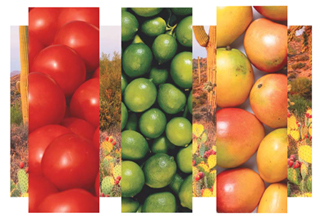With Mexico as the largest supplier of fresh fruit and vegetables to the United States, valued at more than $6.5 billion annually, Nogales continues to be a top conduit for North American trade. Even when the U.S. government shut down and federal employees were furloughed last October, U.S. Customs and Border Protection workers remained on the job to clear load after load of perishables, and kept this massive trade pipeline moving.
And although Nogales is a small city, it has long been a point of crossing for the region—originally as a trade route, then later by Conquistadors in search of North American gold. In 1918, following a battle between the U.S. Army and Mexican militia, the previously open crossing built its first permanent border. In 1973, the Nogales-Mariposa Arizona Port of Entry was built to divert border-crossing truck traffic away from downtown, and by mid-2014, the newly expanded Mariposa port of entry will be completed.
The New Port of Entry: Almost Here
For decades, the Nogales-Mariposa port of entry has been operating well over capacity, struggling to pass more than 600,000 trucks and 2.6 million cars in recent years. Delays were legendary. For truckers, possible two- to four-hour waits were common during off-peak months, while four- to eight-hour delays in peak season made for major challenges in delivering perishable fruits and vegetables.
The new Mariposa port will double capacity, from four to eight commercial lanes, and significantly increase offloading areas. The project is on schedule for completion in August 2014, at a price tag of about $187 million, much of which came from the Recovery and Reinvestment Act of 2009, according to the U.S. General Services Administration.
Staffing of the new port remains a bone of contention—while the new 216,000-square-foot entry point promises to expedite crossing, there is still insufficient funding to add the additional 200 to 250 staff members required to run at full capacity.
Distributors and shippers alike are enthusiastic about the potential for increased efficiency, but note that the staffing issue remains an obstacle. “We’re still seeing a lot of trucks cross late,” remarked Gabe Nunez, managing member at Golden Desert Produce, LLC. “Maybe because it is not fully operational yet.”
“Even though they’ve increased the size of the facility, there are still delays,” confirmed Rick Burkett, director of sales at Greenpoint Distributing, LLC. “Not all the lanes are open,” he concedes, “but if it were fully manned, I think it could be more efficient.”



